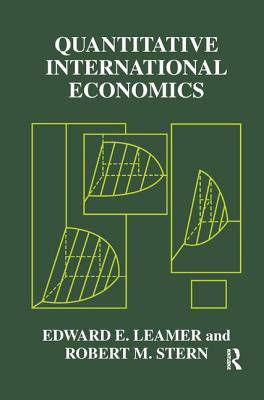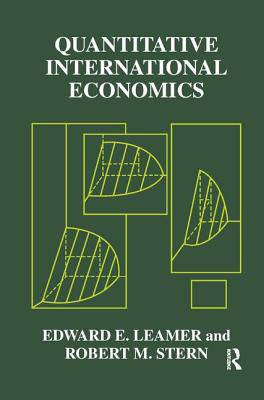
- Afhalen na 1 uur in een winkel met voorraad
- Gratis thuislevering in België vanaf € 30
- Ruim aanbod met 7 miljoen producten
- Afhalen na 1 uur in een winkel met voorraad
- Gratis thuislevering in België vanaf € 30
- Ruim aanbod met 7 miljoen producten
Zoeken
€ 274,95
+ 549 punten
Uitvoering
Omschrijving
This distinctive book sets forth, on an advanced level, various methods for the quantitative measurement of important relationships at issue in areas of the balance of payments and international trade and welfare. The results achieved in recent studies are presented and the directions for new research are indicated. This book is composed of two main parts.Part I deals with the balance of payments and consists of the first half of the book. One of the longest and almost important chapters of this part talks about, at length the time-series analysis of the demand for imports and exports from the point of view of an individual country. This subject has a long and somewhat checkered history dating from the 1940's, when a number of estimates using least squares multiple regression methods were made of import and export demand functions for the interwar period. The noteworthy feature of many of these estimates was that they suggested relatively low price elasticities of demand in international trade. The implication was thus drawn that the international price mechanism could not be relied on for balance-of payments adjustment purposes.This book talks about the topics of theory and measurement of the elasticity of substitution in international trade, estimating the international capital movements, and forecasting and policy analysis with econometric models. Part II deals with international trade and welfare. While, there are many other books dealing with trade theory, this title focuses on a narrower range of topics that are not always mentioned or understood by individuals, such as the theory and measurement of trade dependence and interdependence, the analysis of the component factors a country has that affects how its export growth is over time, and the welfare effects of trade liberalizationThis book serves as a guide and reference work for economics graduate students, academicians, and practicing economists in private and governmental circles. They will find this book a valuable and highly useful.Edward E. Leamer is Chauncey J. Medberry Professor of Management at the UCLA department of Economics. He is a research associate at the National Bureau of Economic Research, a fellow at the American Academy of Arts and Sciences and the Econometric Society, and director of the UCLA Anderson Forecast. He has published over 100 articles and 4 books.Robert M. Stern is Professor emeritus of Economics and Public Policy at The University of Michigan, Ann Arbor. He is the co-director of the Research Seminar in International Economics at the Gerald R. Ford School of Public Policy. He is also head of the Ford School International Concentration and the Ford school program of research on U.S. Japan international economic relations.
Specificaties
Betrokkenen
- Auteur(s):
- Uitgeverij:
Inhoud
- Aantal bladzijden:
- 224
- Taal:
- Engels
Eigenschappen
- Productcode (EAN):
- 9781138531338
- Verschijningsdatum:
- 2/08/2017
- Uitvoering:
- Hardcover
- Formaat:
- Genaaid
- Afmetingen:
- 163 mm x 236 mm
- Gewicht:
- 430 g

Alleen bij Standaard Boekhandel
+ 549 punten op je klantenkaart van Standaard Boekhandel
Beoordelingen
We publiceren alleen reviews die voldoen aan de voorwaarden voor reviews. Bekijk onze voorwaarden voor reviews.











